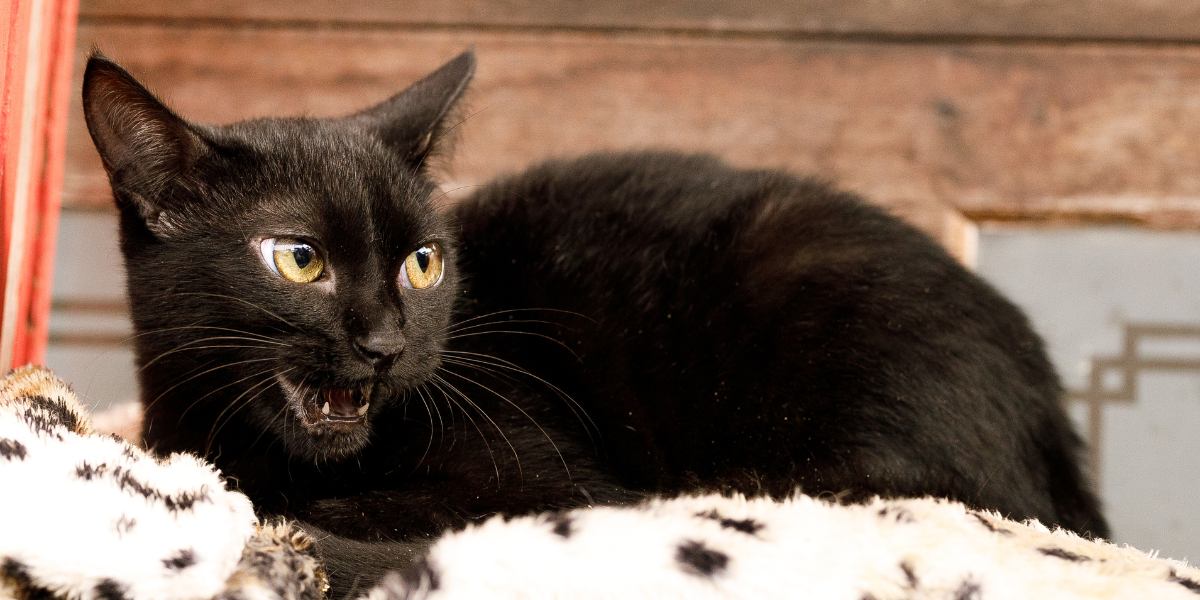A cat making noise when sleeping could indicate a dream or a medical issue. Observe your cat’s behavior and seek medical attention if necessary.

Cats are fascinating creatures, known for their quirky behaviors. Many cat lovers enjoy observing their feline companion while they nap throughout the day. However, what should you do if your cat is making noise when sleeping? Should you be concerned, or is this simply a normal behavior?
In this article, we will explore the reasons why cats make noise when sleeping, how to tell if your cat’s noises indicate a dream or a problem, and what to do if your cat’s sounds are worrisome.

Credit: cats.com
What Does It Mean When You Hear Your Cat Making Noise When Sleeping?
Hearing your cat make noises while sleeping can be concerning. Understanding the various types of noises cats make when sleeping can help you interpret them better. Some common sounds include snoring, chirping, and purring. Snoring is normal, but if it’s ongoing, it might indicate a respiratory problem.
Chirping is common when dreaming of catching prey or playing, and purring means your cat is comfortable or trying to soothe itself. If the noise is unusual, such as coughing or wheezing, it could mean an underlying medical condition. Pay attention to your cat’s sleeping sounds, and consult a veterinarian if you’re unsure about any of them.
Common Reasons Why Cats Make Noise When Sleeping
Cats are known for their peaceful and restful sleep, but what if your feline makes noise while sleeping? Although it may look adorable, it could indicate a discomfort due to a medical issue. Some cats may show signs of stress and anxiety when they sleep, which could result in mild vocalizations.
Dreaming is another reason why cats may make noise when sleeping. If your cat has hearing or vision loss, it may vocalize to orient itself in its surroundings. If you’re concerned about your cat’s noise while sleeping, it’s always best to consult with a veterinarian.
Medical Issues That Could Cause Your Cat To Make Noise When Sleeping
Cats make all sorts of sounds when they sleep, from purring to meowing to chattering. But sometimes, their noises can indicate a medical issue. Respiratory issues like congestion or tumors can cause loud breathing or snoring. Gastrointestinal problems can lead to gurgling or growling stomach noises.
Feline asthma, which is a chronic lung disease, can cause coughing and wheezing sounds. Dental pain can also cause your cat to make noise while sleeping, as teeth grinding can be an indication of soreness. If your cat’s sleeping sounds are different from usual, have them checked by a veterinarian to rule out any underlying health issues.
How To Help Your Cat Sleep Better
Cats are fascinating creatures, but sometimes their quirky habits can cause concern. If your cat is making noise while sleeping, it may be a sign that they are not sleeping well. To help your furry friend get a good night’s rest, start by providing a comfortable sleeping environment.
This can include a cozy bed, a quiet room, and a warm blanket. It’s also important to maintain consistency in your cat’s daily routine, including feeding, playtime, and sleep schedules. Additionally, incorporating relaxation techniques into your cat’s routine can help reduce stress and anxiety.
Try playing soft music, using calming scents, or practicing gentle massage. By taking these steps, you can help your cat sleep better and improve their overall well-being.
Frequently Asked Questions For Cat Making Noise When Sleeping
Cats often make noises while sleeping due to dreaming or breathing difficulties. It can also be a sign of a medical issue like sleep apnea. If the noise is persistent, consult with your vet.
In most cases, it is not dangerous if your cat makes noise while sleeping. However, if the noise is persistent or accompanied by other symptoms, consult your vet.
Providing a comfortable sleeping environment, a regular sleep routine, and keeping your cat engaged during the day can help improve their sleep quality.
If your cat’s sleeping habits change suddenly, such as sleeping excessively or not sleeping, or if they exhibit other concerning symptoms, it’s best to consult your vet.
Some common sleep disorders for cats include narcolepsy, sleep apnea, and restless leg syndrome. If you suspect your cat has a sleep disorder, consult with your vet.
Conclusion
It’s common for cats to make noises when sleeping, especially during certain stages of their rest. Some cats snore, while others whimper or make soft chirping sounds. While these sounds are usually nothing to worry about, it’s important to pay attention to any changes in your cat’s sleeping habits, especially if they are accompanied by other symptoms such as difficulty breathing or excessive twitching.
If you’re concerned about your cat’s sleep habits, it’s always a good idea to consult with your veterinarian to rule out any underlying health issues. Additionally, making sure your cat has a comfortable sleeping space and is getting enough exercise and stimulation during the day can also help improve their sleep quality.
With proper care and attention, your furry friend can enjoy sweet dreams and deep restful sleep.











